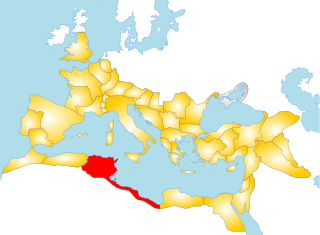
The gens Petronia was a plebeian family at ancient Rome. This gens claimed an ancient lineage, as a Petronius Sabinus is mentioned in the time of Lucius Tarquinius Superbus, the last of the Roman kings, but few Petronii are mentioned in the time of the Republic. They are frequently encountered under the Empire, holding numerous consulships, and eventually obtaining the Empire itself during the brief reign of Petronius Maximus in AD 455.

Lucius Mussius AemilianussignoAegippius who held a number of military and civilian positions during the middle of the third century. He is best known as a Roman usurper during the reign of Gallienus.
Marcus Statius Priscus Licinius Italicus was a Roman senator and general active during the reigns of Hadrian, Antoninus Pius, and Marcus Aurelius. Contemporary sources refer to him as Marcus Statius Priscus or simply Statius Priscus. He was consul for the year 159 as the colleague of Plautius Quintillus; Priscus was one of only two homines novi to attain the ordinary consul in the reigns of Antoninus Pius and Marcus Aurelius.
Publius Aelianus Aelianus was a senior officer in the Imperial Roman army in the mid-Third Century AD who rose from relatively lowly origins to become the prefect of a legion under the Emperor Gallienus He was one of the earliest beneficiaries of Gallienus's policy that effectively excluded senators from army commands in favour of career-soldiers of equestrian rank. His later life is obscure.

Tenagino Probus was a Roman soldier and procuratorial official whose career reached its peak at the end of the sixth decade of the third century AD. A poverty of primary sources means that nothing is known for certain of his origins or early career. However, in later years he served successively as Praeses (governor) of the province of Numidia and of Egypt,. These were both very senior procuratorial offices, the latter in particular traditionally considered one of the pinnacles of an equestrian career. In these roles he exercised military skills in addition to administrative ones; as Praefectus Aegypti he led military operations outside his province. He died resisting the invasion of Egypt by the forces of Zenobia of Palmyra in the troubled interregnum between Emperors Claudius II and Aurelian.
Marcus Sempronius Liberalis was a Roman eques who held a number of appointments during the reign of the Emperor Marcus Aurelius. He is known from military diplomas and non-literary papyrus.
Titus Haterius Nepos was an eques who held a number of imperial Roman positions during the reigns of Trajan and Hadrian. The two most important posts were praefectus vigilum or commander of the vigiles or nightwatch, and praefectus or governor of Egypt (120-124). According to Fergus Millar, Nepos was the first eques who was promoted from regular procuratorial posts into a proper secretarial appointment.
Gaius Minicius Italus was a Roman eques who flourished during the reign of the emperors Vespasian, Domitian, and Trajan. He was appointed to a series of imperial offices, both military and civil, culminating with praefectus or governor of Roman Egypt.
Quintus Baienus Blassianus was a Roman eques who held a number of military and civilian positions during the reign of the Emperors Antoninus Pius and Marcus Aurelius, including praefectus of the Classis Britannica, and of Roman Egypt.
Lucius Valerius Proculus was a Roman eques who held a number of military and civil appointments during the reigns of the Emperors Hadrian and Marcus Aurelius. He is known primarily from inscriptions and non-literary papyrus.
Titus Longaeus Rufus was a Roman eques who is known to have held imperial appointments during the reign of the Emperor Commodus. He is known from inscriptions and surviving documents written on papyrus.
Gaius Valerius Eudaemon was a Roman eques who held a number of military and civilian positions during the reigns of the Emperors Hadrian and Antoninus Pius, which includes praefectus of Roman Egypt. He is known as a close friend of the emperor Hadrian.
Gaius Tettius Africanus Cassianus Priscus was a Roman eques who held a number of appointments during the reigns of the emperor Vespasian and his sons. Pavis d'Escurac observes that Priscus is the only known eques to hold the ranks of both praefectus vigilum, praefectus annonae ; Priscus was also praefectus or governor of Roman Egypt.
Marcus Bassaeus Rufus was a Roman senator, who held a number of appointments during the reigns of the emperors Antoninus Pius, Marcus Aurelius and Commodus. The most notable of these were praefectus vigilum, praefectus or governor of Roman Egypt, and praetorian prefect.
Titus Aius Sanctus was a Roman eques, who held several important imperial appointments then was later promoted to senatorial rank. Sanctus was consul suffectus around 185.
Titus Furius Victorinus was a Roman eques who held a number of appointments during the reigns of the Emperors Antoninus Pius and Marcus Aurelius. The most prominent of these offices were praefectus vigilum, praefectus or governor of Roman Egypt, and praetorian prefect.
Claudius Julianus was a Roman eques and jurist who held a number of military and civilian positions during the reign of the Emperor Septimius Severus, most importantly praefectus or governor of Roman Egypt. His relationship to other Claudii Juliani is unknown.
Tiberius Claudius Secundinus Lucius Statius Macedo was a Roman eques who held a number of appointments in the second century AD, the best known of which was praefectus annonae, or overseer of the food supply of Rome. Macedo is known only from a series of inscriptions.
Marcus Petronius Honoratus was a Roman eques who held a number of military and civilian positions during the reigns of the Emperors Hadrian and Antoninus Pius, which included praefectus annonae and praefectus or governor of Roman Egypt.

Lucius Julius Vehilius Gratus Julianus was a soldier and an eques who held a number of military and civilian appointments during the reigns of Marcus Aurelius and his son Commodus. Julianus received honors two separate times for his military service.